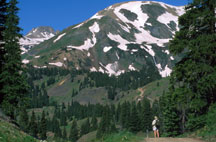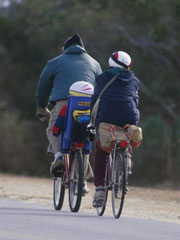
|
|
| Getting Acclimated to High-Altitude Living | ||||||||||||||||||
|
Colorado has the highest altitude of any state in the nation. The average elevation is 6,800 feet for the state. High-altitude living can present challenges for the unprepared and for those coming from low altitudes. The air is literally thinner, the atmospheric pressure lower, the sun is a mile or two closer, and the seasonal transitions can be unpredictable. The uninitiated can experience medical problems, culinary catastrophes, and botanical disasters. All these, however, can be avoided with a little understanding of how the world works at nosebleed altitudes.
Newcomers to Colorado may experience a variety of medical problems ranging from shortness of breath or a bloody nose to full-blown altitude sickness. |
 |
||||||||||||||||
|
||||||||||||||||||
| Altitude Sickness and Related Symptoms
Nose-bleeds - Many people experience nose-bleeds when they come to Colorado, especially if they come from low-altitude and humid climates. Both a decrease in atmospheric pressure, and the remarkably low humidity levels of high-altitude cause them. There is not much you can do about it, though in most cases the symptoms last only 72 hours or so. Shortness of breath - Even the most physically fit athletes experience a degree of breathlessness during physical exertion at high-altitudes until acclimatization has occurred. Because the air is thinner here, it contains less oxygen by volume than at sea level. Heavy breathing can barely compensate for the lack of oxygen until your body has adjusted. Many professional sports teams arrive in Denver several days before a big game to allow the players time to adapt. The best advise is to avoid heavy exertion until you have had time to adjust to new heights. Acclimatization varies from person to person; your body will be the best judge. |
 |
|||||||||||||||||
| Sunburn - At higher altitudes, concern also needs to be given to radiation dangers (sunburn). At higher altitudes, the air is actually thinner than at sea level and can not screen-out the same amount of radiation. In fact, at 6,000 feet UV rays are approximately 50-60 percent stronger than at sea level . Simply put, sunburn can occur more quickly and severely at high altitude, where the sunlight is reflected by snow or water. Use sunblock during outdoor activities. | Eye irritation - Many people experience varying degrees of eye irritation after arriving in Colorado. This is caused by the same factors that induce nosebleeds. The low humidity levels tend to dry out the sensitive tissues of the eyes. Also, if you happen to be in the Denver Metro area during a temperature inversion, the infamous "brown cloud" of toxins can aggravate this irritation. The quickest relief comes from lubricating eye drops. | |||||||||||||||||
| Altitude sickness - Some visitors to Colorado experience altitude sickness upon arrival in Denver. Others seem comfortable on the top of one our 14,000 foot mountains. Altitude sickness is an individual thing, most unpleasant and should be taken very seriously.
The condition itself results from a state of acute oxygen deficiency (hypoxia) which can occur at altitudes above 12,000 feet. Symptoms of hypoxia include mild intoxication and stimulation of the nervous system, followed by progressive loss of attention and judgment. If left untreated, unconsciousness will occur and a prolonged lack of sufficient oxygen may cause permanent brain damage. |
 |
|||||||||||||||||
| For newcomers, a mild case of altitude sickness can produce light-headedness, nausea, headache, excessive yawning and a general feeling of malaise. Watch alcohol consumption at high-altitudes because alcohol may increase the effects or likelihood of the symptoms. Take it ease the first couple of nights at the ski-lodge and if you think you are experiencing altitude sickness, slow down, descend to lower altitudes, and ask for help.
For more information visit "high altitude information web site" |
||||||||||||||||||
| High altitude gardening is unique and challenging. High altitude climates of low humidity, drying winds, fluctuating temperature, untimely freezes and snows, and generally proor soil conditions can cause gardeners to consider throwing the hoe in the trash. As frustrating as it may seem at times for high altitude gardeners, positive rewards will come to those who are patient. You will love the information about high altitude gardening on the Neils Lunceford website. | ||||||||||||||||||
Coldwell Banker Residential Brokerage. Hosted and maintained by GeeX, Inc |
||||||||||||||||||





